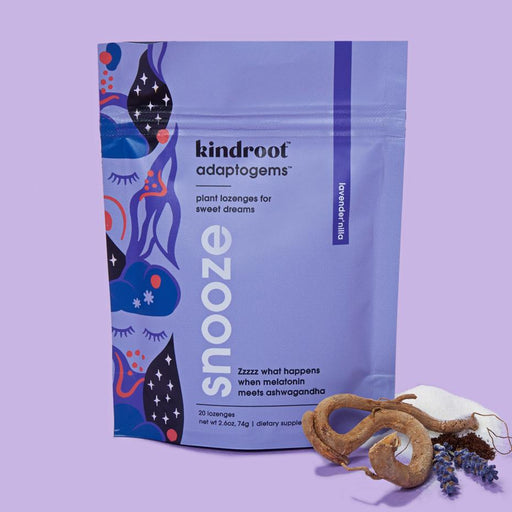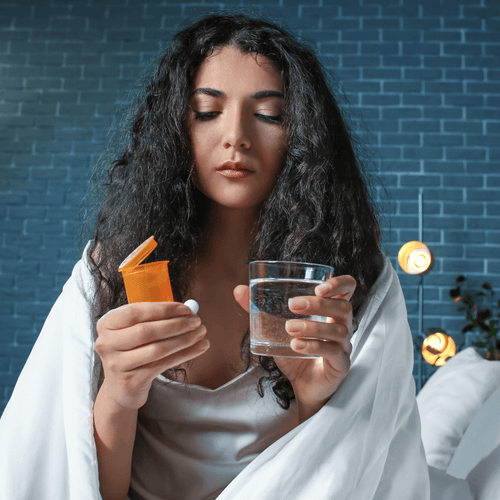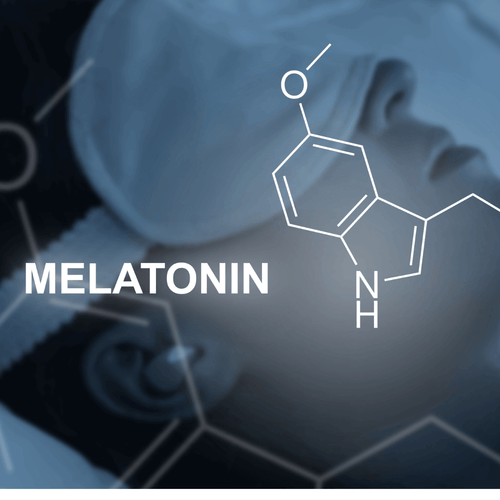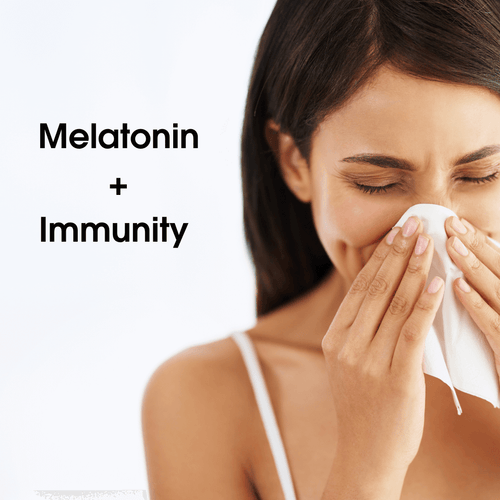Though it’s most famous for its sleep-inducing qualities, doctors say melatonin also boasts anti-anxiety properties. In fact, some studies have shown melatonin to be more effective at relieving anxiety than perioperative anti-anxiety medications. Here’s how melatonin helps with anxiety, plus doctor-recommended dosages and additional tips.
Discover Kindroot Snooze: Melatonin + Ashwagandha Lozenges for Sleep
Contents
- How melatonin reduces anxiety
- Melatonin is as effective as anti-anxiety medications
- Can melatonin cause anxiety?
- How much melatonin to take?
- How to make melatonin part of your anti-anxiety plan
How melatonin reduces anxiety
Research shows melatonin may reduce anxiety via multiple pathways.
Melatonin, the Ultimate Guide: Uses, Side Effects, Safety & FAQ
Longer, better sleep
Many people with anxiety report problems sleeping. One study found that it's possible to predict anxiety levels based on how much “quality” sleep you get the night before – and sleepless nights can increase anxiety levels by as much as 30%.
Free Sleep Tracker: Track your sleep patterns & how they influence your day
Produced by the pineal gland, melatonin regulates our sleep cycles. Higher melatonin levels signal to our bodies that it's time to sleep, while lower melatonin levels signal that it's time to wake. That's why many people take melatonin supplements to help them get to sleep and stay asleep.
Melatonin, then, could reduce anxiety by helping you get the sleep you need to wake rested, refreshed, and less anxious.

Increased GABA levels
"Research has shown that melatonin can potentially cause increased production of GABA – gamma-aminobutyric acid – a calming neurotransmitter in the nervous system linked to reduced levels of stress and improved moods,” says Dr. Joshua Flatow, Medical Director and Chief Psychiatrist at Pacific Mind Health in Long Beach, California. “However, more studies are needed before we fully understand how this works and its exact effects on mental health."
A 2017 study found that melatonin prevents sleep deprivation-associated anxiety in rats, with underlying mechanisms related to "GABAergic and glutamatergic transmission." The study's authors noted that melatonin increases GABA levels in the brain and that melatonin can interact with GABA to induce a tranquilizing effect.

"GABA is a neurotransmitter that plays a vital role in regulating mood, stress levels and other neurological processes related to anxiety," explains Dr. Sarah Watson, psychologist, certified coach and Chief Operating Officer at BPTLAB, an innovative personality testing solutions provider.
HPA protection
The hypothalamic-pituitary-adrenal (HPA) axis plays a critical role in stress response, regulating many physiological processes throughout the body. Melatonin may help maintain a healthy HPA axis, which in turn can mitigate stress and reduce anxiety.
"Research has found that melatonin can have protective effects on the HPA axis, another critical component of the body's stress response system," says Dr. Watson.
How melatonin boosts immunity, according to experts
Increased oxytocin and serotonin
One study found that melatonin suppressed anxiety-like behavior in rats subjected to chronic immobilization stress. Melatonin appeared to play a role in increasing oxytocin, serotonin and noradrenaline levels while reducing the expression of a stress-inducing protein.
Can melatonin make you smarter? Here’s what doctors say
Studies suggest melatonin works as well as anti-anxiety medications
"Some studies have been carried out showing that melatonin can reduce stress around surgery," says Dr. Alex Dimitriu, M.D., a double board-certified physician (Psychology and Sleep Medicine) who founded Menlo Park Psychiatry & Sleep Medicine as well as BrainfoodMD. "In a 2015 review paper, the authors noted benefit to pre- and post-surgical anxiety in people pre-treated with melatonin – in one instance, with similar benefit to midazolam."

One study, titled "Melatonin in Perioperative Medicine," concluded that:
- Melatonin is a safe and effective anxiolytic (anti-anxiety medicine) before surgery
- Melatonin's anti-anxiety effect is comparable to that of midazolam, a synthetic drug, with less psychomotor impairment
- After surgery, melatonin may foster quicker recovery with less sedation
- Taking melatonin during perioperative care results in less sleep cycle disturbance
- Melatonin may prevent delirium in pediatric and cognitive dysfunction in elderly surgical patients
Other studies have shown that melatonin may be just as effective at reducing anxiety in medical settings as two other anxiolytics, alprazolam and oxazepam.
Unisom VS. Melatonin: Which is best for sleep?
Given that medical settings are among the most nerve-wracking for many of us, the fact that melatonin reduces anxiety during perioperative care suggests it's just as effective for other anxiety-inducing situations: flight anxiety, anxiety before a job interview, general stress at home and work, for example.
Read: How to use melatonin for jet lag: What sleep coaches say
Melatonin might one day be indicated for panic attacks since it increases GABA, which could play a role in alleviating them, but more research is needed in this area.
Of course, consult a doctor if you're concerned about your anxiety or feel you might have an anxiety disorder.
Can melatonin cause anxiety?
Taking too much melatonin could cause anxiety, but it's not likely if you stick to recommended doses. Like any other supplement, medication or food, melatonin can have adverse effects if you take significantly more than indicated.
Read: Does melatonin cause nightmares and dreams?
"There is some evidence that higher doses of melatonin can increase anxiety in specific individuals. This effect is typically seen with very high doses, and many experts believe that normal or moderate amounts are unlikely to trigger this response," says Dr. Watson.
How much melatonin to take for anxiety
Melatonin dosages and when to take it vary by person, so it's a good idea to experiment until you identify the perfect dosage and timing.
For anxiety, a general rule of thumb for adults is to take 1 to 3mg of melatonin 1 to 3 hours before bed.

"When it comes to finding the right melatonin dose for your anxiety, a personalized approach is key," says Dr. Flatow. "Start slow and be sure to consult with a healthcare provider before taking any supplement – after all, what works best may not work at all for another."
Kindroot Snooze: Melatonin Lozenges Made with Natural Ingredients
More is not better, and you should always take melatonin at night. Don’t take melatonin in the morning or during the day unless instructed by a doctor before surgery and other situations in which you're able to rest.
Luden's Melatonin Soothers were discontinued. Here's a better alternative
"It is recommended that people only use this supplement in the evenings or at night and avoid taking it during waking hours," says Dr. Watson. "It is because melatonin may interfere with sleep cycles, potentially exacerbating anxiety and stress."
Dr. Dimitriu recommends starting with a low dose (as low as 300 micrograms) and waiting one to two weeks to reassess.
"Watch closely for next day fatigue or decline in mood," he says.
It's a good idea to consult your healthcare provider before taking melatonin for anxiety, Dr. Watson says, echoing that you should closely monitor your body for any potential side effects.
"Other factors to consider are whether you have any pre-existing health conditions and possible interactions with any other medications or supplements you may be taking," she says.
How to make melatonin part of your anti-anxiety plan
For best results, combine melatonin supplements with other strategies for reducing stress and anxiety.
"In addition to taking melatonin, there are many other things that people can do to help reduce anxiety," says Dr. Flatow. "Overall, it is important to find a combination of strategies that work best for you and to keep trying new."

Dr. Flatow recommends:
- Relaxation techniques such as deep breathing, meditation or yoga
- Regular exercise, which can reduce stress and improve overall health
- A healthy and balanced diet, which can help support mental health
- Avoiding caffeine, alcohol and other substances that can worsen anxiety
- Getting enough sleep and establishing a regular sleep routine
Dr. Dimitriu stresses the importance of sleep and slowing down to reduce anxiety.
"Making sure to get enough sleep – seven-plus hours per night – and exercise by day can play a big role in reducing anxiety," he says. "Slowing down, practicing mindfulness and reducing stress can also be helpful. Many of us simply do too many things, and the answer is to do less. In my work, I often say that a 20% reduction in activity (business/stress) can result in a 50% improvement in happiness."
Best over-the-counter sleep aids: What doctors say
If you're unable to alleviate your anxiety on your own, be sure to consult a healthcare professional. There are many coaches, therapists and doctors who can help.
Research shows that melatonin is an effective anti-anxiety supplement. Speak to your doctor and follow the advice outlined here to determine if melatonin is a good treatment option for your anxiety.
Disclaimer: The information stated in this article is for educational purposes only. The information stated is not intended to treat, diagnose or cure any disease, condition, or other physical or mental ailment of the human body. The desire to make any changes to one's dietary habits or supplementation should be consulted and discussed with a licensed medical professional.




